Florida, Texas, and Arizona have recently reported the highest single-day totals of new COVID-19 cases. The data suggests that reopening too quickly, without adequate guidelines and restrictions is a documented failure. Consequently, Washington State is the latest state to delay its reopening plans. No matter how much we want to return to our normal lives, our lives before COVID-19, we must remain vigilant! The Director of the National Institute for Allergies and Infectious Diseases, Dr. Anthony Fauci, has repeatedly said, “You don’t make the timeline; the virus makes the timeline.”
The pandemic is not over and is not going away anytime soon. We can’t just go off to bars, sporting events, concerts, or summer camps and pretend all is well. Instead, we must learn to live with the virus for now. While feelings of frustration, confusion and even depression have become commonplace, we cannot let our guard down…whether your area is in red, yellow, green or phase 1, 2, or 3.
According to Aaron Hamilton, MD, Associate Chief Safety and Quality Officer at The Cleveland Clinic, “There’s still a lot of COVID-19 in our communities and in our hospitals. We’ve done a lot in society to flatten the curve, which kept people safe and helped healthcare manage the critically ill patients – but this isn’t going away over the course of the summer. The virus is not gone.”
As states and businesses open back up and life tries to carry on, it can be tricky to determine what activities and events are safe and what’s worth skipping. Dr. Hamilton feels that being aware of (and following!) the proper guidelines and safety measures can help you determine the risk level associated with a particular activity. There are actions we can all take that might not look or feel normal, but they can help protect us as we all learn to live in this new world.
Less is better! Carefully weigh how much time you’ll be spending at the activity. Less time means limiting your risk of exposure to the virus.
Where is the activity or event being held...outside or indoors? If it’s indoors, consider how enclosed or ventilated the space is. We know that it’s safer to be outside than inside (but that doesn’t mean the risk of catching the virus outdoors is zero). You should also consider if the space has a limit on how many people can be there at one time. This will clue you in to how easy or difficult it will be to maintain physical distance from others.
Are the people attending the activity or event outside of your direct household? Consider if they will be following and respecting safety guidelines, which include:
“When thinking about the risk of an activity, I like to think of it as a spectrum,” explains Dr. Hamilton. “It’s less about safe vs. not safe, and more about layers of risk. Everybody will have to do a risk assessment for themselves and determine where they’re comfortable and what safety guidelines they’re going to follow.”
On one end of the spectrum, the absolute safest thing to do is to stay at home with your family. On the other end of the spectrum would be large, indoor gatherings. Certain activities will always carry a much higher risk than others. A large, indoor concert is going to be more dangerous than an outdoor picnic with a couple of friends who are following safety measures. How often you choose to partake in riskier activities and events matters as well.
The degree of safety depends on the degree to which you comply with the guidelines.
(Dr. Aaron Hamilton, The Cleveland Clinic)
As we all try to determine our new normal, remind yourself that the recommendations are there to keep COVID-19 in a place where we can manage it until we have treatments and vaccines available.
Source: Cleveland Clinic
EVERY MONDAY – Read Dr. Paul J. Mackarey “Health & Exercise Forum!”
Check out all of Dr. Mackarey's articles in our archives at: https://mackareyphysicaltherapy.com/forum/
This article is not intended as a substitute for medical treatment. If you have questions related to your medical condition, please contact your family physician. For further inquires related to this topic email: drpmackarey@msn.com
Paul J. Mackarey PT, DHSc, OCS is a Doctor in Health Sciences specializing in orthopaedic and sports physical therapy. Dr. Mackarey is in private practice and is an associate professor of clinical medicine at Geisinger Commonwealth School of Medicine
Difficulty sleeping during the COVID-19 quarantine has become a common problem and can be manifested in a variety of ways; insomnia, fragmented sleep and nightmares. National prescription providers have reported a 21% increase in anti-insomnia, anti-anxiety and antidepressant medications since March of 2020. The past two weeks in Health & Exercise Forum” have been dedicated to sleep wellness.
We discussed the importance of sleep for health and wellness. Sleep is crucial to us as a species, but it is not always easily attained. For many individuals across the globe, sleeping properly can be a challenge. The trial and tribulations of the human experience can lead to restless nights and early morning risings without adequate sleep. This week, we will discuss how lack of quality or quantity of sleep can impact our lives in many ways and make suggestions to improve your sleep hygiene.
Although it may be tempting to sleep in on weekends after a long week of classes, some studies report that this habit results in a smaller volume of the gray matter of the brain in adolescents. Also, in this report, students who altered their sleep pattern on weekends had a lower grade average than those who did not. Therefore, it seems that it is not only important to maintain an average healthy average amount of sleep each night, but also to stay consistent with the hours that you are asleep.
There are many studies that have linked unhealthy sleep patterns to obesity. Inadequate sleep causes irregular levels of the hormones that are responsible for telling our brains when we need to eat. Therefore, this hormone imbalance can lead to obesity and thus make us vulnerable to the dangerous effects dramatically increased body fat.
A healthy sleep schedule has been shown to reduce the risk of heart disease and stroke, which are two of the leading causes of death in the United States. For example, interruptions in sleep due to disorders like sleep apnea have been shown to be a risk factor for stroke and that persistent tiredness often preceded heart disease.
Whether you are a high school or collegiate athlete, or simply enjoy some daily exercise, a healthy sleep schedule can help maximize performance. It is worth noting that it is possible that athletes require different sleep patterns than the general population to reach peak performance. Moreover, it has been shown that sleep loss is linked to a decreased ability in athletes to store sugar in the muscle to use as energy during a workout.
Needless to say, there are a plethora of things that can negatively impact our sleep. Even one night of poor sleep can drastically impact our performance and ability to concentrate the following day. So how do we combat this? There are several simple habits that can improve sleep hygiene and increase the likelihood of getting a good night’s sleep.
There are thousands of other resources that can help us achieve a great night’s sleep. Apps like “Calm” and “Headspace” have guided meditations and relaxation techniques to help us unwind before bed. More useful information about healthy sleep and why it is important can be found on Harvard Medical School’s Healthy Sleep website. And there are hundreds of thousands of YouTube videos with relaxation techniques and informative healthy sleep videos to be discovered. If these interventions do not improve your sleep, talk to your primary care doctor and see which next steps are right for you.
Sleeping well is not always easy and there will undoubtedly be nights on which rest eludes us despite our best efforts. But with consistent healthy sleep habits, we will be on our way to a healthier and better tomorrow.
For More Informations:
-http://healthysleep.med.harvard.edu/healthy/
-https://jamanetwork.com/journals/jamainternalmedicine/fullarticle/2110998
-https://www.sciencedirect.com/topics/medicine-and-dentistry/insomnia
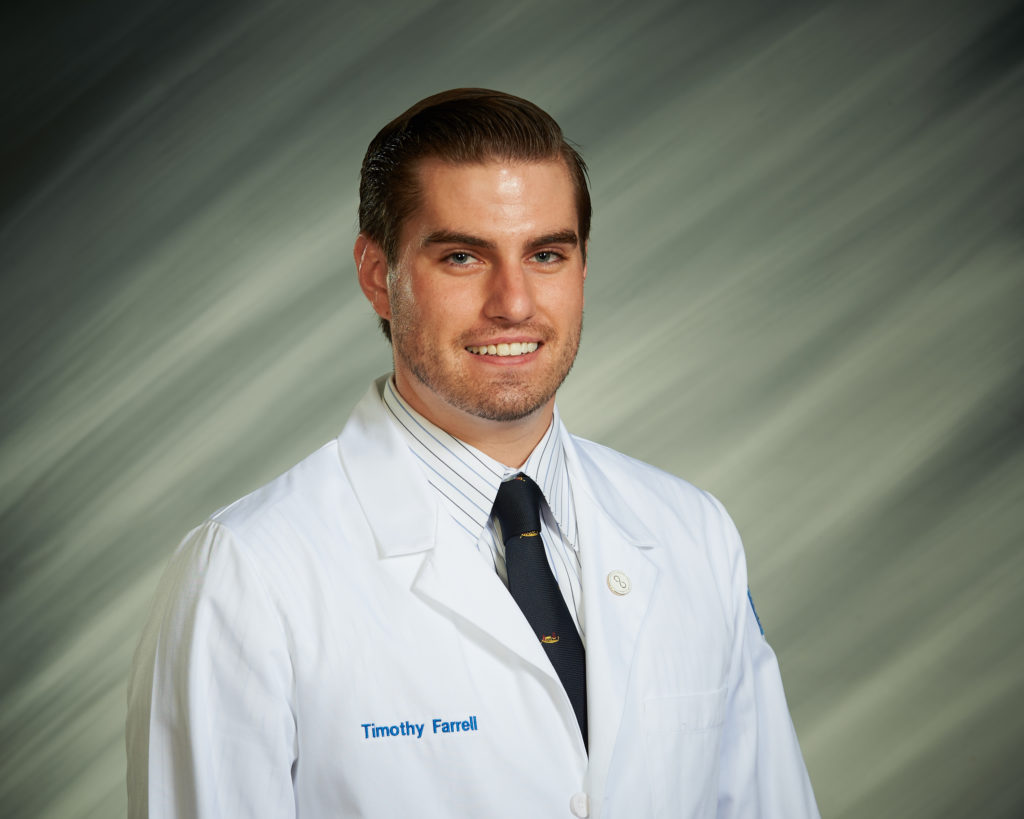
Timothy Farrell, MD3
Tim Farrell is a third year medical student at Geisinger Commonwealth School of Medicine. Originally from Clarks Summit, Pennsylvania, Tim received his bachelor’s degree from Loyola University Maryland in Baltimore, MD. Currently a 2nd Lieutenant in the US Army, he enjoys listening to music, running, and spending time with his two dogs. He volunteers with the Cody Barrasse Foundation in the Organ Transplant Assistance Program, where he helps patients receive grant funding as they await their transplant surgery. He hopes to pursue a career in General Surgery.
This article is not intended as a substitute for medical treatment. If you have questions related to your medical condition, please contact your family physician. For further inquires related to this topic email: drpmackarey@msn.com
Paul J. Mackarey PT, DHSc, OCS is a Doctor in Health Sciences specializing in orthopaedic and sports physical therapy. Dr. Mackarey is in private practice and is an associate professor of clinical medicine at Geisinger Commonwealth School of Medicine.
Part I of II
Difficulty sleeping during the COVID-19 quarantine has become a common problem and can be manifested in a variety of ways; insomnia, fragmented sleep and nightmares. National prescription providers have reported a 21% increase in anti-insomnia, anti-anxiety and antidepressant medications since March of 2020. The next two weeks in Health & Exercise Forum” will be dedicated to sleep wellness.
We do it every night, hopefully. Children are doing it. Our grandparents are doing it. Teenagers do it all the time. We sleep of course. These hours in which we slumber are vital to our ability to function during the day and to our health overall. It does not appear evolutionarily advantageous for us to be unconscious for extended periods of time. Modern science tells us that much of our body’s restoration, strengthening, and processing occurs while we sleep. Our brains consolidate the information they have learned throughout the day and enhance our memory. Additionally, sleep restores sugar storage in our brains and improves the functioning of our immune system. But science does not illuminate why we need such a prolonged period other than the fact that we just seem to get sleepy after a long day.
Sleep is crucial to us as a species, but it is not always easily attained. For many individuals across the globe, this author included, sleeping properly can be a challenge. The trial and tribulations of the human experience can lead to restless nights and early morning risings without adequate sleep. But what is considered “adequate” sleep? The answer depends on your age. As we grow older, our sleeping requirements change drastically from infancy to elderdom. Infants are learning and processing so much information of this new world they now inhabit. Thus, their brains need enough time to analyze and consolidate the data, necessitating 12 to 15 hours of sleep. As we advance into adulthood, our sleep requirements drop to approximately 7 to 9 hours with some variability from person to person. Good indications of a restful night’s sleep include waking up feeling refreshed, functioning with enough energy for your daily tasks, and having continuous sleep- meaning there are not extended periods of time of wakefulness when we are supposed to be sleeping.
This seems easy enough to say, but significantly more difficult to do. Current reports demonstrate that roughly 100 million people suffer from insomnia at some point each year, with 25% progressing to long-term chronic sleep insufficiency. Insomnia is described as difficulty falling asleep or staying asleep for three nights per week for at least two consecutive weeks in a three-month period. There are a lot of unhealthy sleeping habits permeating the country. We measure the quality of sleep in two different dimensions duration (quantity) and depth (quality). The duration is straightforward enough. Do you sleep for the recommended 7 to 9 hours per night? The quality is a little more difficult to quantitate. Some individuals may sleep for the proper duration of time, but the depth is not adequate. Sleep quality is determined by the number of arousals or awakenings in a given night. As few as 5 arousals in a night can result in daytime sleepiness and performance deficits. In addition, how long we remain in certain phases of sleep also determines the quality of our sleep. There are four stages of sleep: N1, N2, N3, and REM with N3 being the most restful of the stages. When we fall asleep, we go through a predictable descent into sleep. We repeat the cycle of N1 to N2 to N3 to REM sleep every 60 to 90 minutes. The more time we remain in the restful stages, N3 and REM, the better our sleep is. As we age, we inevitably spend less and less time in restful sleep.
There are many factors that influence how we sleep. Everything from what we drink to the type of curtains we have can impact those crucial hours of sleep. Some of the more common culprits that disrupt our sleep are:
For More Informations:
-http://healthysleep.med.harvard.edu/healthy/
-https://jamanetwork.com/journals/jamainternalmedicine/fullarticle/2110998
-https://www.sciencedirect.com/topics/medicine-and-dentistry/insomnia
Read Dr. Mackarey’s Health & Exercise Forum – every Monday. Next Week Read, Sleep and Wellness Part II.
This article is not intended as a substitute for medical treatment. If you have questions related to your medical condition, please contact your family physician. For further inquires related to this topic email: drpmackarey@msn.com
Paul J. Mackarey PT, DHSc, OCS is a Doctor in Health Sciences specializing in orthopaedic and sports physical therapy. Dr. Mackarey is in private practice and is an associate professor of clinical medicine at Geisinger Commonwealth School of Medicine.
Read all of Dr. Mackarey's articles in our health and exercise forum: https://mackareyphysicaltherapy.com/forum/
Guest Columnist: Timothy Farrell, MD3

Tim Farrell is a third year medical student at Geisinger Commonwealth School of Medicine. Originally from Clarks Summit, Pennsylvania, Tim received his bachelor’s degree from Loyola University Maryland in Baltimore, MD. Currently a 2nd Lieutenant in the US Army, he enjoys listening to music, running, and spending time with his two dogs. He volunteers with the Cody Barrasse Foundation in the Organ Transplant Assistance Program, where he helps patients receive grant funding as they await their transplant surgery. He hopes to pursue a career in General Surgery.
Special Feature “ Health & Exercise Forum” with Geisinger Commonwealth School of Medicine-- the third Monday of every month!
Guest Columnist: Kathryn Schmidt, MD

Personal Bio: Kathryn received her medical degree from Geisinger Commonwealth School of Medicine in 2019 and is now an Internal Medicine resident at University of Utah Health in Salt Lake City. She loves her program and her new city, both of which allow her to optimize her wellness, with easy access to skiing, hiking, and other outdoor activities. Prior to medical school, she attended the University of Wisconsin-Madison for her undergraduate studies and Northwestern University where she completed a post-baccalaureate pre-medical and health program. Throughout school, she worked as a research assistant, first with stem cell transplant recipients and women affected by gynecological cancers, and then with solid organ transplant patients. During medical school, she served as a volunteer at the Care and Concern Clinic, as well as at an organization called Pathstone, acting as a mentor to men and women who were transitioning back into the community after having spent time in prison. During her last year of medical school, she received a global health scholarship that allowed her to teach English in Thailand, with an emphasis on preventative health care topics. She has joined the global heath track within her residency program and hopes to continue to stay engaged in global healthcare throughout her career. When not working, she likes to kick-box, ski, hike, write, and be in the company of good friends or family, whether that be taking a weekend camping trip to a new place or just having a board game night. Something that makes her really happy is traveling… she has been to all 7 continents and is always ready for the next adventure!
My name is Kathryn, and I am a resident physician in Salt Lake City, far away from family, who reside in various locations on the East Coast. It’s always tough to be so far from family, but especially now. I know everyone is experiencing their own version of disappointment or grieving for a lost sense of normalcy, but my hope is that the more effectively we deal with this now, the sooner we can get back out there - where everything should be waiting for us, just as we left it. I’m finding it harder and harder to complain, given that I have patients who can’t see their families due to strict, but necessary rules, yet still happily greet me each morning when I wake them up before it’s light outside. In the meantime, I am grateful for and energized by all the people around me doing good. I am in awe of everyone in SLC (from my residency program director, the hospital administrators who have come to personally check in, the people working tirelessly to find creative solutions to obtain additional masks and ventilators, and all of the hospital staff who help in both medical and non-medical ways to the restaurant/grocery store workers and other essential community workers etc etc ETC), and on a larger scale - Utah, the US, and the entire world - who are coming together to figure this mess out.
Most of us are going through a roller coaster of emotional states as this storm –called COVID-19 – continues to gain momentum, with global impact. Millions of people are experiencing major life changes. If this resonates with you, you are not alone. People have been self-quarantining or socially isolating for various amounts of time. With the cancellation of planned trips and weddings, the closing of schools and colleges, and mandated work-from-home arrangements, it is easy to be discouraged, especially given that we aren’t yet seeing the light at the end of the tunnel. While each person will respond differently to the challenges we are facing, fear and anxiety seem to be two feelings commonly cited during this difficult time.
While there is no perfect solution, there may be some helpful things you can do to feel more in control of your day-to-day emotions and general well-being. Different things work for different people, and there isn’t any single, correct way of doing things, so I would recommend getting rid of “should do’s” and expectations. Collectively, we need to cut ourselves some slack and realize that this is a process of trial and error. My hope is that we can feel a sense of togetherness and global solidarity despite physical isolation, understand how to continue living in this very unusual and weird time, and ultimately, find some peace among the chaos.
1. Social distancing and self-quarantine can be isolating and lonely, but social distancing does not mean we must socially isolate. Take this opportunity to use face time or the phone to catch up with friends and family. Set up virtual happy hours or dinner dates via Face Time or Zoom or try having a game night through Jack Box Games.
2. Focus on general wellness. There are many free apps right now for meditation, yoga, stretching, online exercise classes, and breathing techniques. Additionally, be sure to stay hydrated, get a good night’s rest, and get some fresh air. In many areas, walking outside in areas where you can be 6 feet from other people is okay to do. Make a sound track of your favorite relaxing or pump-up music to go along with your stretching or work out routines.
3. Do those things you have been meaning to do for the last month, but always seem to put off. This is the perfect time to try out a new recipe, read a new book, catch up on your favorite tv show, organize your closet, teach yourself a new language (a little bit each day goes a long way), try out a new hobby or craft (there are apps for learning to draw, scrap-booking, etc.), play a new board game or do a new puzzle, or come up with something else fun and unexpected. Get creative!!
4. Be present. As someone who likes to plan ahead of time, living day to day has helped me to be more present in the now rather than worrying about the future. It has also helped me to focus on the enjoyable activities of day-to-day life rather than worrying about always being in some spectacular place or taking some awe-inspiring picture. This is a time to reset and find our way back to what is most important in our individual lives.
5. Reach out to others. It is easy to feel alone, but sending a text or card can make someone else’s day. You could also consider making cards for people in nursing homes who can’t currently see their families, donate blood if you’re healthy and meet all requirements, foster an animal from a local shelter, or buy groceries for elderly neighbors. Additionally, having a sense of purpose can increase your happiness and help you to feel more fulfilled.
6. Recognize that the emotions you are feeling are valid & normal. AND talk about them. It is okay to grieve the loss of normalcy. It is also okay to not be okay, but please reach out and allow others to assist you while you’re feeling this way. While it is certainly okay to feel this way, it can be helpful to list a few things each day that you are grateful for. Committing to the daily practice of writing down just a few things that we are grateful for helps to re-wire connections in the brain making it easier to choose happiness in times of distress.
7. Be productive. Regarding working from home, find a place at home you can work away from the spaces where you sleep or play. Try to find a spot with good lighting. De-clutter your space (and your mind). Eliminate distractions. Set a time during which you will focus on your work and stick to it. During this time, try to avoid checking news about COVID-19 and save all the social media and meme hunting as a reward for after you have finished your work for the day. It may be helpful to outline your goals and priorities for the day. An organized to-do list will keep you focused on the specific tasks at hand and checking items off provides a sense of accomplishment. If you have children, try incorporating their structure they may need.
8. Exercise. We all know this is easier said than done though. So choose to do things that fulfill your daily exercise needs. Use an indoor exercise bike, treadmill or elliptical, climb the stairs for 10-15 minutes, lift soup cans or use exercise bands.
9. Spend more time outdoors. Fresh air, scenic views, and a little vitamin D from the sun can make all the difference…but practice social distancing!
10. Fake it until you make it. It sounds silly, but the more you smile, even if it’s fake, positively affects how you feel because it triggers something in the brain that makes you happier…AND LAUGH. Only second to loving, laughing is the easiest way to feel like everything is going to be okay.
Read Dr. Mackarey’s "Health & Exercise Forum" every Monday in the Scranton Times-Tribune.
This article is not intended as a substitute for medical treatment. If you have questions related to your medical condition, please contact your family physician. For further inquires related to this topic email: drpmackarey@msn.com
Paul J. Mackarey PT, DHSc, OCS is a Doctor in Health Sciences specializing in orthopaedic and sports physical therapy. Dr. Mackarey is in private practice and is an associate professor of clinical medicine at Geisinger Commonwealth School of Medicine.
Special Feature “ Health & Exercise Forum” with Geisinger Commonwealth School Of Medicine – The third Monday of every month!

Guest Columnist: Kathryn Schmidt, MD
Personal Bio: Kathryn received her medical degree from Geisinger Commonwealth School of Medicine in 2019 and is now an Internal Medicine resident at University of Utah Health in Salt Lake City. She loves her program and her new city, both of which allow her to optimize her wellness, with easy access to skiing, hiking, and other outdoor activities. Prior to medical school, she attended the University of Wisconsin-Madison for her undergraduate studies and Northwestern University where she completed a post-baccalaureate pre-medical and health program. Throughout school, she worked as a research assistant, first with stem cell transplant recipients and women affected by gynecological cancers, and then with solid organ transplant patients. During medical school, she served as a volunteer at the Care and Concern Clinic, as well as at an organization called Pathstone, acting as a mentor to men and women who were transitioning back into the community after having spent time in prison. During her last year of medical school, she received a global health scholarship that allowed her to teach English in Thailand, with an emphasis on preventative health care topics. She has joined the global heath track within her residency program and hopes to continue to stay engaged in global healthcare throughout her career. When not working, she likes to kick-box, ski, hike, write, and be in the company of good friends or family, whether that be taking a weekend camping trip to a new place or just having a board game night. Something that makes her really happy is traveling… she has been to all 7 continents and is always ready for the next adventure!
Most people have heard the expression, “worried sick,” but did you know that you can worry enough to the point where it results in emotions that leave you physically ill? For the normal person, this isn’t good, but for the cancer patient, this is just downright dangerous. During my undergraduate education at the University of Wisconsin-Madison, I worked in a research lab that examined various predictors of recovery from cancer. Specifically, we examined the extent to which mood disturbance impacts cancer patients’ recovery following hematopoietic stem cell transplantation (HSCT), which is just a fancy term for a medical procedure in which a donor’s stem cells can be given to a patient suffering from certain cancers of the blood or bone marrow, like leukemia or multiple myeloma. Without getting into the complexity of the study, at the most basic level, we wanted to find out if patients who found meaning in their illness, didn’t avoid unwanted thoughts and emotions, and generally felt less depressed prior to transplant had more successful recoveries and stronger immune systems post-transplant.
Our study results echoed the conclusions of similar studies conducted prior to ours, demonstrating that there is indeed crosstalk between our psychological states and the neuroendocrine and immune systems, or in other words, our mental state can affect our physical state.
In patients undergoing HSCT, this is particularly salient, given the critical role of immune restoration in preventing recurrence of cancer, reducing complications, and ensuring survival. Distress, depression, and anxiety have been associated with a downregulation of immune responses relevant to tumor containment among cancer patients, and depressed mood has been linked to relapse and poorer survival following HSCT.1 So now that we know these things, if you are a cancer patient, fighting for your life, the importance of being happy is no longer just for your sanity, but is quite literally one way to increase your chances at a successful recovery. Interesting, right? But how does this apply to you? Well, you don’t have to have cancer for depression or other emotions to weaken your immune system. This basic concept is applicable to all of us in our everyday lives, and this link between the mind and body may be more powerful than you think…especially during this COVID-19 Crisis!
Here are just a few examples of what I’m talking about…
Most of us are going through a roller coaster of emotional states as this storm –called COVID-19 – continues to gain momentum, with global impact. Millions of people are experiencing major life changes. If this resonates with you, you are not alone. People have been self-quarantining or socially isolating for various amounts of time. With the cancellation of planned trips and weddings, the closing of schools and colleges, and mandated work-from-home arrangements, it is easy to be discouraged, especially given that we aren’t yet seeing the light at the end of the tunnel. While each person will respond differently to the challenges we are facing, fear and anxiety seem to be two feelings commonly cited during this difficult time.
While there is no perfect solution, there may be some helpful things you can do to feel more in control of your day-to-day emotions and general well-being. Different things work for different people, and there isn’t any single, correct way of doing things, so I would recommend getting rid of “should do’s” and expectations. Collectively, we need to cut ourselves some slack and realize that this is a process of trial and error. My hope is that we can feel a sense of togetherness and global solidarity despite physical isolation, understand how to continue living in this very unusual and weird time, and ultimately, find some peace among the chaos.
We can’t control everything but we can try to control our psychological state and not allow negatively affect our physical health and immune systems, and if we are sick with something serious, we need to do everything in our power to give ourselves the best fighting chance at recovery. Just knowing that mood and psychological well-being affect our physical state is motivation in itself to decide that we are going to choose happiness. This is not to say that you can’t ever be in a bad mood… you can! We all have bad days, but we should work harder to not let our bad moods consume us.
NEXT WEEK: Part 2: Tips for Being Happy & Healthy During COVID-19 Crisis
Read Dr. Mackarey’s "Health & Exercise Forum" every Monday in the Scranton Times-Tribune.
This article is not intended as a substitute for medical treatment. If you have questions related to your medical condition, please contact your family physician. For further inquires related to this topic email: drpmackarey@msn.com
Paul J. Mackarey PT, DHSc, OCS is a Doctor in Health Sciences specializing in orthopaedic and sports physical therapy. Dr. Mackarey is in private practice and is an associate professor of clinical medicine at Geisinger Commonwealth School of Medicine.

A healthy immune system may be the difference between recovery from illness and dying. While you may not be able to improve an otherwise healthy immune system, you can take steps to maintain its health and integrity. Exercise is one of the best ways to maintain a healthy immune system.
With the closing of fitness centers, school gyms and exercise classes due to COVID-19, it may be a good time to begin a home exercise program that is quick and easy. For some, home exercises can be done before or after working from home to gain or maintain muscle tone. For others, home exercises may help maintain independence and safety performing daily activities around the house such as; climbing stairs, getting in and out of a shower, putting on shoes and socks, cooking, cleaning, and carrying groceries or laundry.
I have comprised 10 simple exercises including upper and lower body and balance and core. The only equipment you will need is a chair and resistance bands; yellow has the least resistance, black the most, red, green, blue in between. They can be purchased at any sporting goods or department store.
Remember, for most people it is more harmful not to exercise, so contact your physician to discuss whether independent exercise is appropriate for you. If you have special needs, you may need to consult with a physical therapist to get started. Good luck…I hope this helps you survive the COVID-19 quarantine!
These exercises are performed while sitting in a chair with a backrest, slowly. Hold the position for 3 seconds. Perform 5 -10 repetitions. Do these exercises 3-5 times per week. Begin with a yellow light resistance band.
Row the Boat (PHOTO 1)
Saw Wood (Photo 2)
Elbow Extension (Photo 3)
Hip Spread (Photo 4)
Hip Hike (Photo 5)
Leg Kicks (Photo 6)
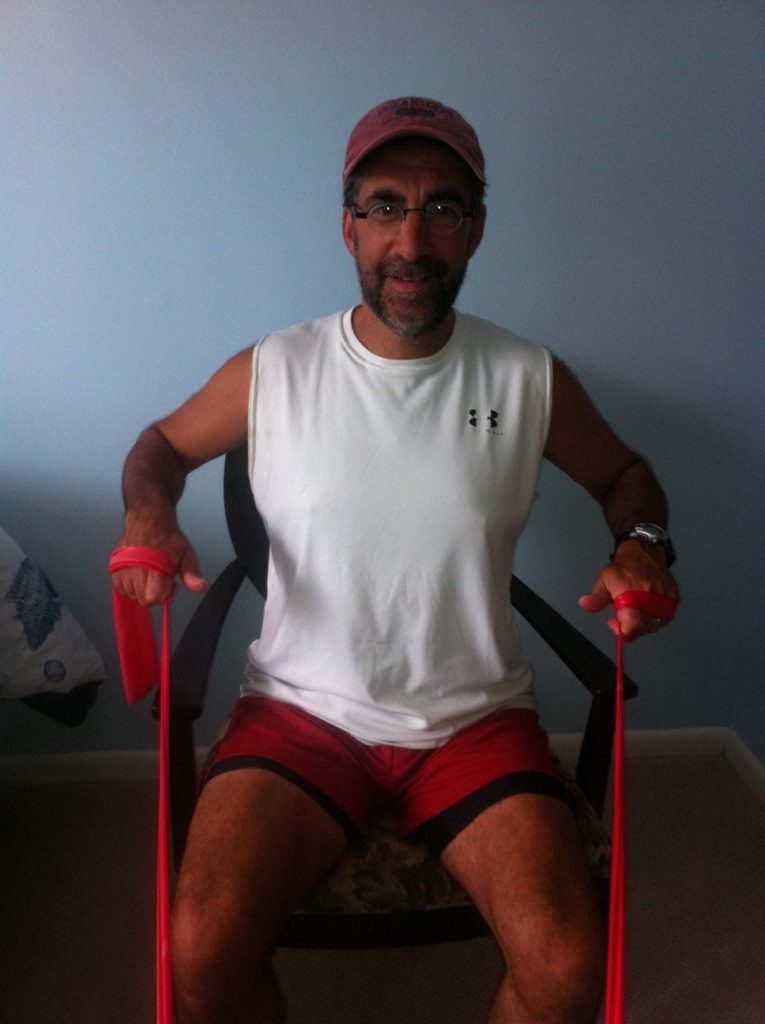
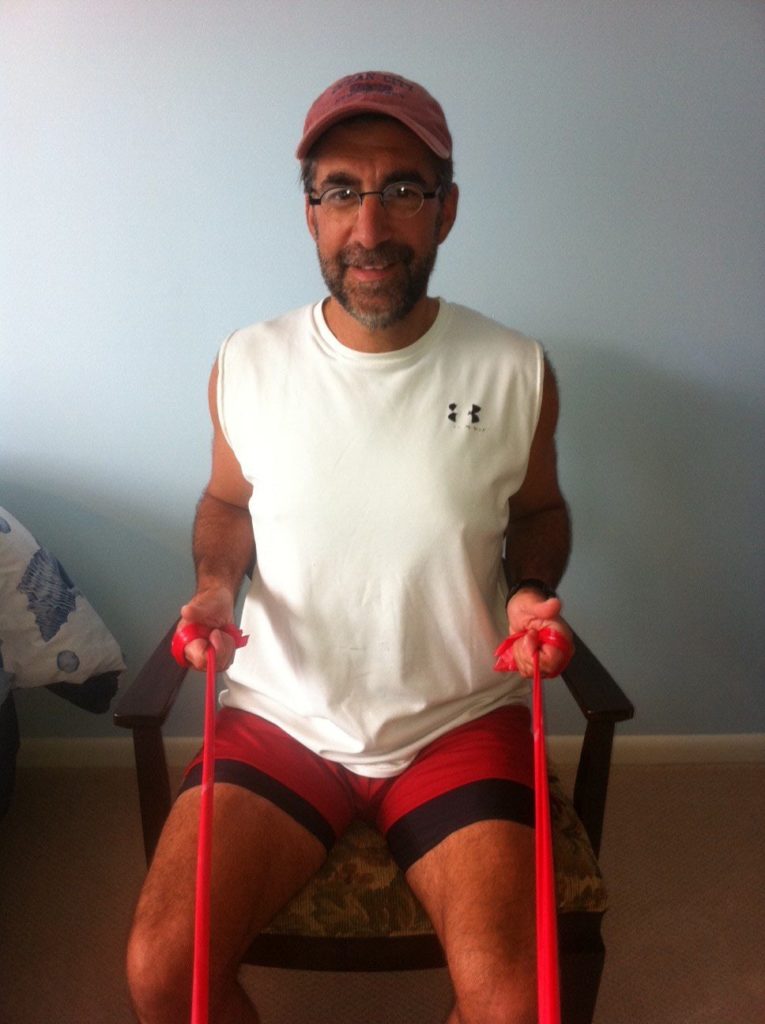
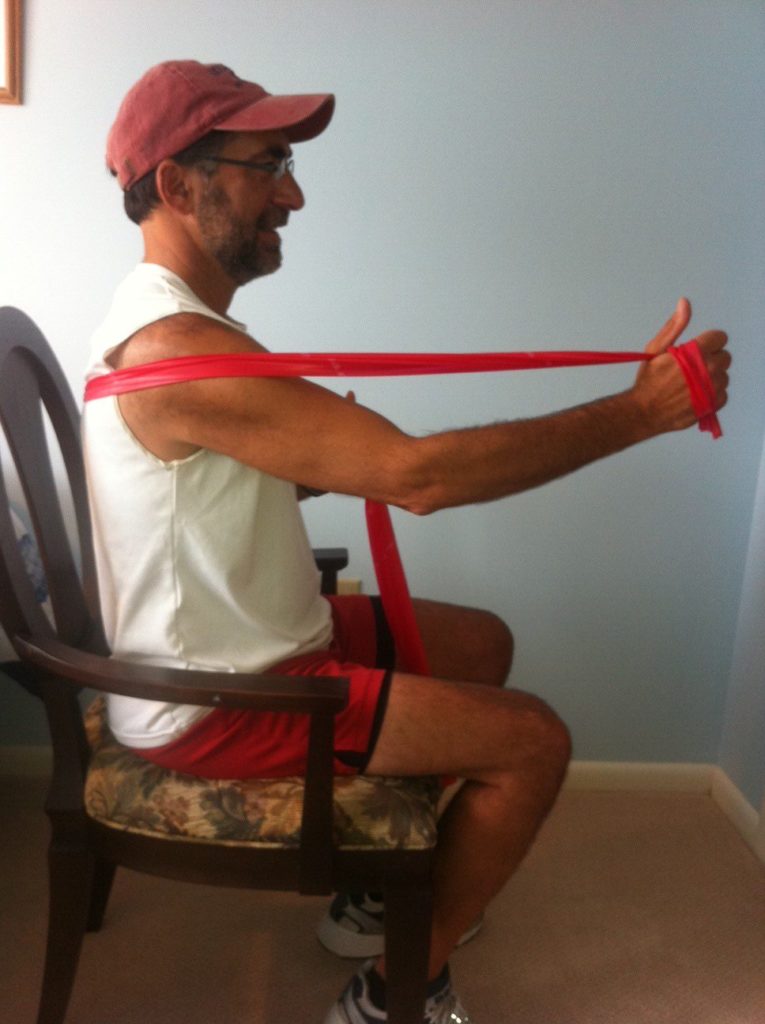
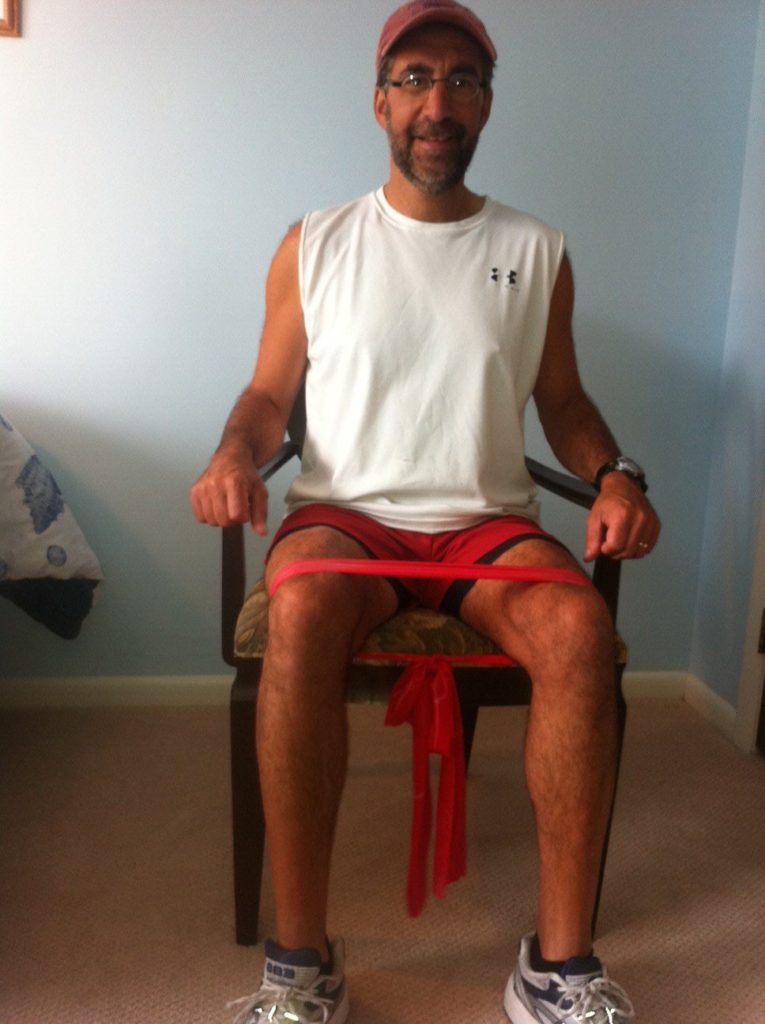
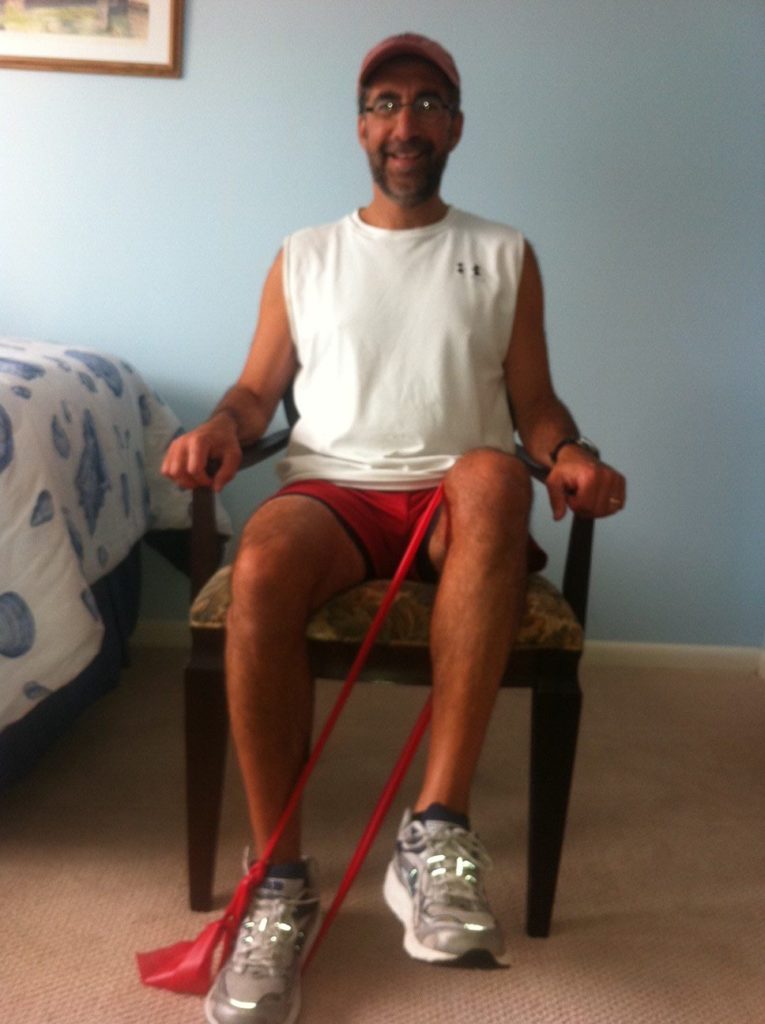
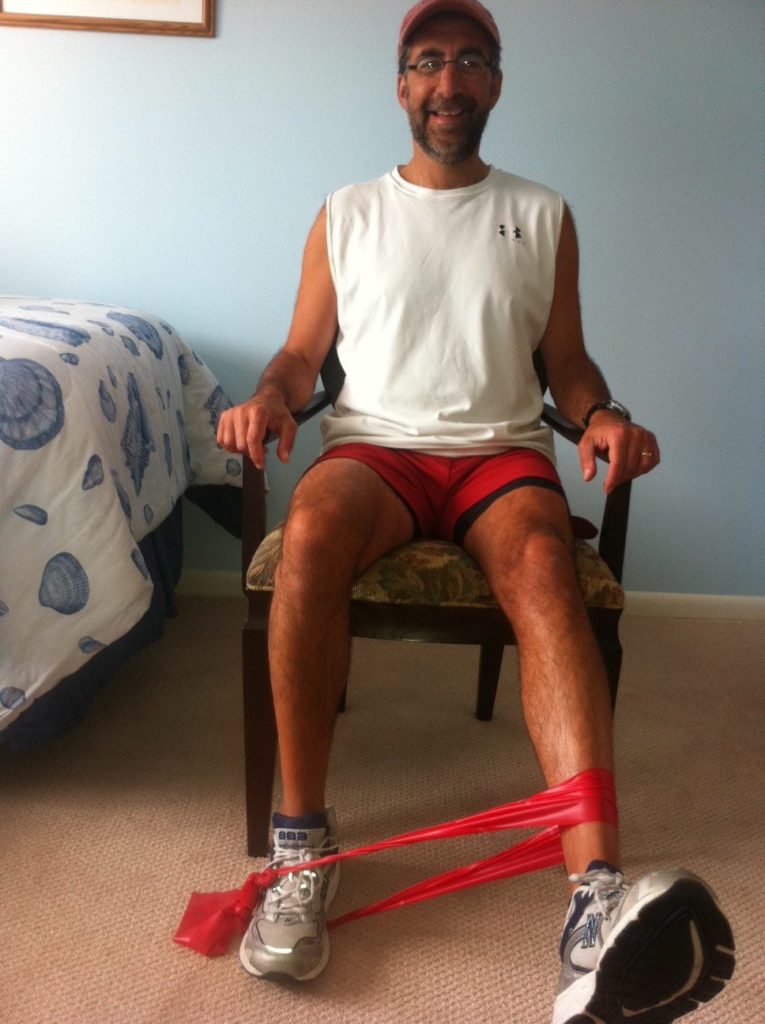
Shoulder Shrug (Photo 7)
Elbow Bend (Photo 8)
Standing Leg Curl (Photo 9)
Standing Walk Aways - Backward (Photo 10)
Standing Walk Aways - Forward
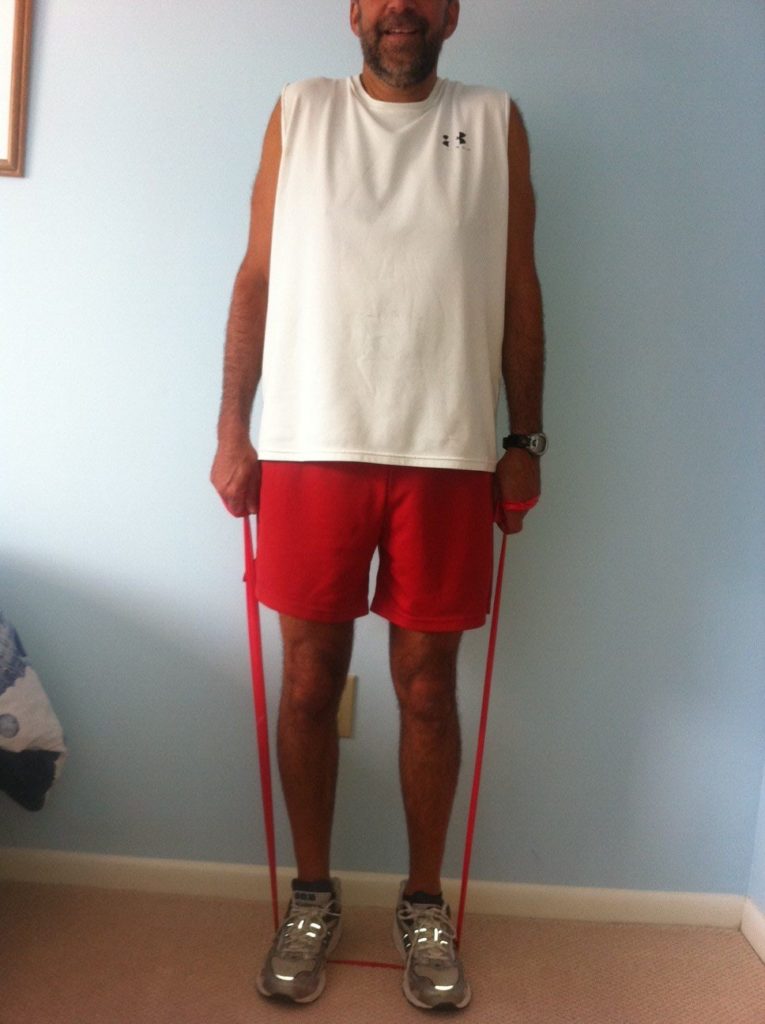
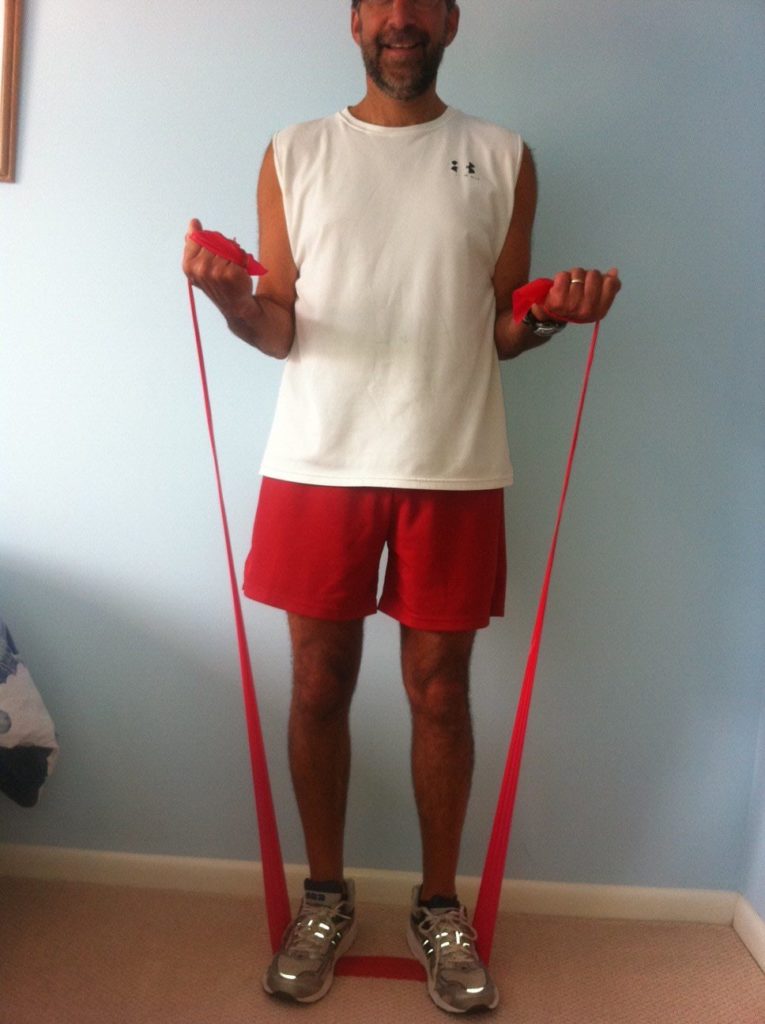
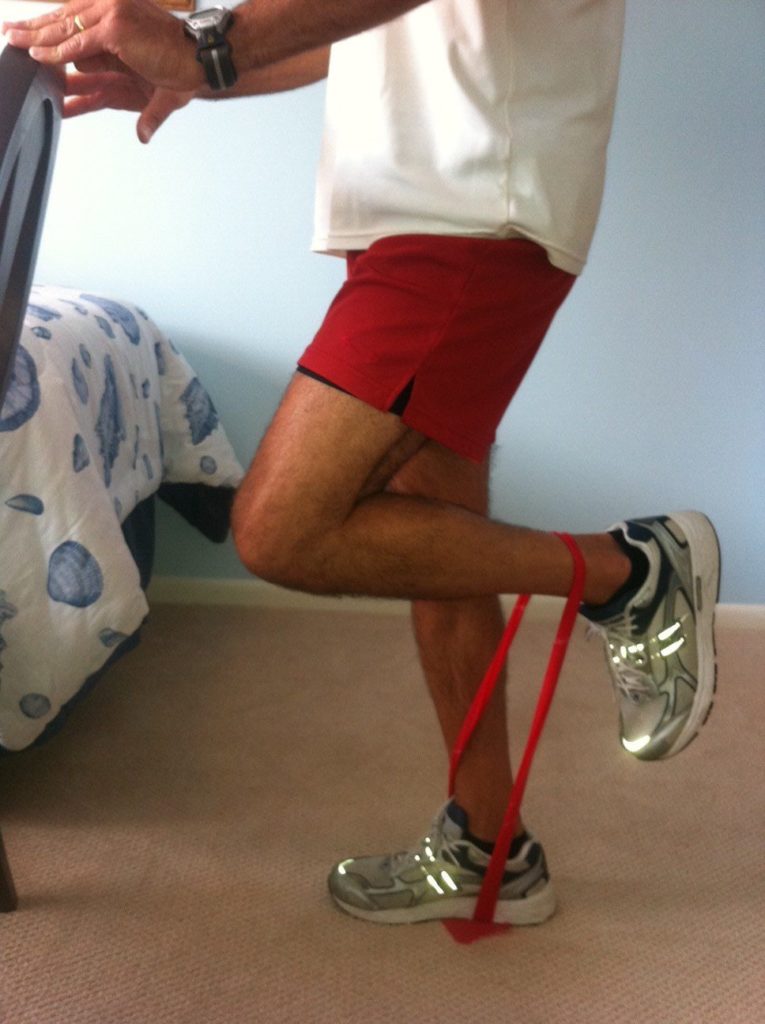
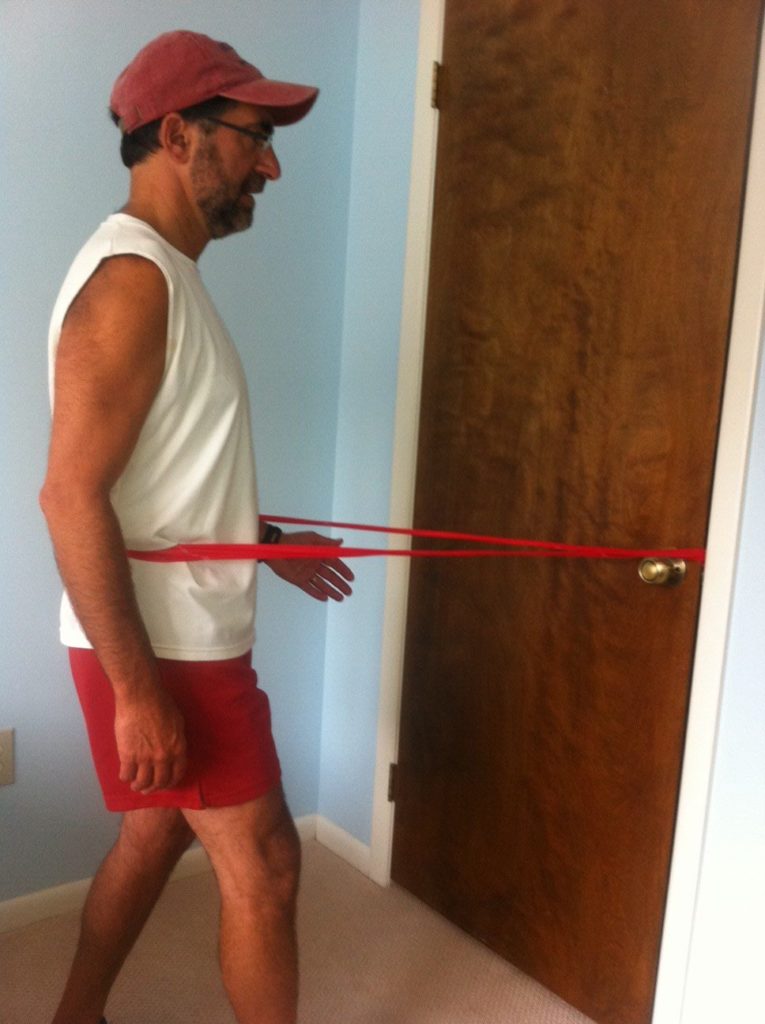
Visit your doctor regularly and listen to your body.
Keep moving, eat healthy foods, exercise regularly, and live long and well!
Read Dr. Mackarey’s "Health & Exercise Forum" every Monday in the Scranton Times-Tribune.
This article is not intended as a substitute for medical treatment. If you have questions related to your medical condition, please contact your family physician. For further inquires related to this topic email: drpmackarey@msn.com
Paul J. Mackarey PT, DHSc, OCS is a Doctor in Health Sciences specializing in orthopaedic and sports physical therapy. Dr. Mackarey is in private practice and is an associate professor of clinical medicine at Geisinger Commonwealth School of Medicine.

The human body is designed to defend against foreign bodies such as germs, bacteria, and viruses, including COVID-19. A healthy immune system may foster a speedier recovery from illness. While you may not be able to improve an otherwise healthy immune system, you can take steps to maintain its health and integrity.
A healthy immune system protects us by creating a barrier that stops invaders or antigens, from entering the body. When an unwelcome invader slips through the barricade, the immune system responds by producing white blood cells and other chemicals and proteins that attack the foreign substances.
Is there a secret to a long and healthy life? Do genes control our destiny? How does lifestyle impact our health? According to the National Institutes of Health (NIH), while genes play an important role, lifestyle plays the biggest role on how healthy you are and how long you live. The food you eat, what you drink, if you smoke, how active you are and how you handle stress are critical factors that determine your longevity. The NIH research has found that smoking, physical inactivity, and poor eating habits are the leading causes of death, in that order.
To maintain a healthy immune system, physical activity is one of the most important factors in improving a lifestyle in a positive way. A minimum of 30 minutes of physical activity, 5 days per week can greatly contribute to longevity. Most experts agree that moderation is important. If you overindulge with exercise you will be at greater risk for musculoskeletal injuries. This is especially true for those who are newcomers. The goal is to gradually work into a fitness program and maintain it for life…now, during home confinement; it may be a good time to begin.
Researchers have found that the benefits of regular physical activity are numerous. Some of the more important benefits are:
Sources: WebMD.
Visit your doctor regularly and listen to your body.
Keep moving, eat healthy foods, exercise regularly, and live long and well!
Next Week: Learn some simple home exercises using Resistance Bands.
Read Dr. Mackarey’s "Health & Exercise Forum" every Monday in the Scranton Times-Tribune.
This article is not intended as a substitute for medical treatment. If you have questions related to your medical condition, please contact your family physician. For further inquires related to this topic email: drpmackarey@msn.com
Paul J. Mackarey PT, DHSc, OCS is a Doctor in Health Sciences specializing in orthopaedic and sports physical therapy. Dr. Mackarey is in private practice and is an associate professor of clinical medicine at Geisinger Commonwealth School of Medicine.